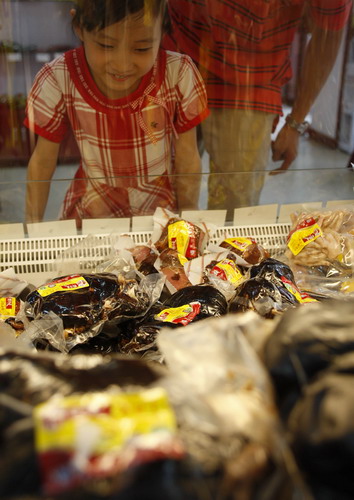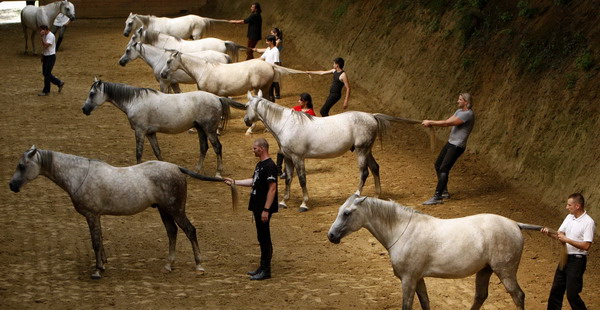Pork price rises hit fall custom
Updated: 2011-08-09 14:40
By Cao Yin (China Daily)
|
|||||||||||
|
 |
|
Customers choose meat products at Tianfuhao food store on Monday. The traditional pork dishes at this time of year have been taken off the menu in some homes because of the soaring price of pork. [Photo / China Daily] |
BEIJING - Monday marked the first day of autumn, according to the Chinese lunar calendar, a time when people traditionally try to boost their weight ahead of the coming winter.
Yet, the special dishes that people traditionally enjoy at this time of year have been taken off the menu in some homes because of the high price of pork.
"I wanted to cook many dishes for my family tonight, but pork is just too expensive," complained Yu Yan, 50, who runs a small restaurant in Chaoyang district.
"The cost of celebrating the tradition is too high now. I've had to reduce the amount of pork I buy."
Li Qiu, the first day of autumn according to the lunar calendar, which fell on Aug 8 this year, is the day when residents in North China start tieqiubiao, a custom dating back to the Jin Dynasty (1115-1234) that involves storing fat for the winter.
Usually this means eating more meat, especially zhouzi, or pork thigh, which is thought to help people replenish the energy and weight they lose in summer.
"The hot and humid weather saps residents of their energy and makes them weak, so the start of autumn is the right time to eat meat," said Chen Wenjun, a saleswoman at Chaoyang district's Daoxiangcun, a Chinese store established as early as 1895.
She said that even though meat prices are soaring customers are still flocking to her store for the traditional foods.
A 360-gram box of zhouzi specially made for Li Qiu is now 38 yuan ($6) at Daoxiangcun, a rise of 6 yuan compared with last year.
For some the rising prices are too much.
"I've given up buying zhouzi, as it's too expensive," said Zhang Xue, 30, a resident who has enjoyed eating meat from Daoxiangcun since she was a child.
Meanwhile, at Tianfuhao, another famous food store, the price of zhouzi has risen to 64 yuan for 500 grams.
"It's probably fair to say this is the highest price since the store was established," said a salesman who did not want to be identified. "Customers spent 54 yuan buying the same food last year, which means a year-on-year rise of 18.5 percent."
China Daily talked to six customers buying meat in the two Beijing stores. All complained about the rapidly increasing price of pork and only one insisted on buying zhouzi.
"It's my habit when the lunar autumn starts," said Liu Yan, a 40-year-old accountant at a State-owned enterprise. "The taste of pork made by traditional brands is more delicious and convenient than home cooking."
However, the ancient tradition also faces a challenge from the decision by many young Chinese to opt for healthier diets.
Kou Fei, 24, an employee at an educational company, insisted she can get all the nutrition she needs from vegetables and fruits
Related Stories
Pork prices drop for second week: MOC 2011-08-03 09:41
Surging China demand buoys US pork 2011-07-22 10:22
Pork producers worried about price hike 2011-07-18 10:19
Ministry: Pork reserves to be released 2011-07-16 10:37
- Tighter policies putting SMEs under pressure
- Chinese automakers hunt for sweet spot
- China's credit card delinquency ratio unchanged
- Lenovo launches second smartphone
- China's July CPI up 6.5%
- China, US plan to work together on product safety
- Rare earth producer H1 net profit surges
- Stocks dive amid US woes













